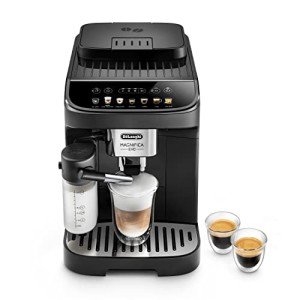A Step-By'-Step Guide For Compact Bean To Cup Coffee Machine
Bean To Cup Espresso Coffee Machine: The Ultimate Guide
Over the last few years, the coffee culture has experienced a considerable improvement, with the rise of home brewing gadgets offering benefit and quality equivalent to coffee shop offerings. Among www.coffeee.uk , the Bean to Cup Espresso Coffee Machine stands out as a favorite amongst coffee connoisseurs and casual drinkers alike. This comprehensive guide explores what these machines are, how they work, the benefits they use, and factors to think about when choosing the best one.
What is a Bean to Cup Espresso Coffee Machine?
A Bean to Cup Espresso Coffee Machine is an advanced coffee brewing gadget that grinds coffee beans fresh for each cup, automating the entire espresso-making process. These machines usually feature integrated grinders, incorporated milk frothers, and exact developing innovation, allowing users to develop top quality espressos, lattes, coffees, and more, all from the convenience of their homes. The benefit, paired with the rich and robust flavors produced, has actually made these machines increasingly popular.
How Does It Work?
The standard operation of a Bean to Cup Espresso Coffee Machine can be broken down into numerous key actions:
Bean Grinding
- The machine grinds whole coffee beans immediately before developing, making sure maximum freshness and taste retention.
Brewing
- Ground coffee is loaded into a filter, and warm water is forced through the coffee grounds at high pressure, which is vital for developing espresso.
Frothing (Optional)
- Many models consist of a steam wand or milk frother for preparing frothed milk for lattes and cappuccinos.
Serving
- The last includes dispensing the brewed coffee into a cup, typically with programmable functions for customization.
Advantages of Bean to Cup Espresso Machines
Investing in a Bean to Cup Espresso Coffee Machine uses various benefits, adding to its growing appeal.
Benefit
Description
Convenience
One-touch operation lessens the time and effort needed to prepare coffee.
Quality
Freshly ground beans result in a richer, more flavorful drink compared to pre-ground alternatives.
Customization
Users can adjust settings to suit personal preferences, consisting of grind size, coffee strength, and milk froth levels.
Cost-efficient
Although the initial investment may be high, savings on coffee purchases from cafés can be significant over time.
Adaptability
The capability to brew different coffee types, from espresso to cappuccino, expands the machine's appeal.
Secret Features to Look For
When picking a Bean to Cup Espresso Coffee Machine, numerous features can affect the purchase decision. Below are necessary factors to think about:
Grinder Type
- Burr grinders are preferred over blade mills for their consistent grind size.
Developing Pressure
- Search for machines that offer at least 15 bars of pressure for optimal espresso extraction.
Milk Frother
- Choose between manual steam wands or automatic milk frothers based upon choices for milk texture and foam.
User Interface
- An user-friendly control board with programmable settings improves the general experience.
Size and Design
- Consider the counter top space offered and choose a design that matches your cooking area looks.
Upkeep Options
- Some machines provide automatic cleaning cycles, which can save effort and time in upkeep.
Popular Bean to Cup Espresso Machines
Choosing a machine that fits one's needs can be difficult. Below is a list of popular designs, understood for their dependability and performance.
Design
Secret Features
Cost Range
De'Longhi Magnifica ESAM3300
Adjustable coffee strength, compact style
₤ 550 – ₤ 700
Breville Barista Touch
Touchscreen controls, incorporated cone-shaped burr mill
₤ 800 – ₤ 1,150
Saeco PicoBaristo
Automatic milk frother, 12 coffee specialties
₤ 900 – ₤ 1,300
Jura E8
Pulse Extraction Process, Alexa Compatible
₤ 1,800 – ₤ 2,500
Gaggia Anima
Easy to clean up, programmable settings
₤ 500 – ₤ 800
Maintenance Tips
Keeping a Bean to Cup Espresso Coffee Machine in good condition is necessary for guaranteeing durability and ideal performance. Here are some maintenance ideas:
- Regular Cleaning: Clean the machine's parts routinely, including the drip tray, coffee premises container, and water reservoir.
- Descaling: Perform descaling every couple of months based upon water hardness and usage to avoid mineral accumulation.
- Modification Water Filter: If the machine has a water filtering system, change the filter as recommended.
- Inspect Seals and Gaskets: Check for wear and tear to avoid leakages and make sure correct pressure during brewing.
FAQs
1. Are Bean to Cup Espresso Machines easy to use?Yes, the majority of designs are designed for user convenience with simple control panels and one-touch operation. 2. Can I use pre-ground coffee in these machines?While some machines enable making use of pre-ground coffee, the primary advantage depends on using whole beans for fresh grinding. 3. How typically must I clean my Bean to Cup machine?Regular upkeep is key; daily cleaning of removable parts and descaling every 2-3 months are normally advised. 4. What is the typical
life-span of a Bean to Cup Espresso Coffee Machine?With correct upkeep, these machines can last anywhere from 5 to 15 years based upon usage quality
**. 5. Are these machines worth the investment?Though they can be expensive, the benefit, quality coffee production, and long-term savings make them a deserving financial investment for lots of coffee lovers. Investing in a Bean to Cup
Espresso Coffee Machine can considerably boost the home
coffee experience. By offering freshly brewed, premium coffee, these machines cater to the growing demand for café-style beverages in the comfort of one's kitchen area. With numerous choices on the market, understanding functions and personal preferences will assist in choosing the perfect machine to match any coffee lover's needs.  **
**